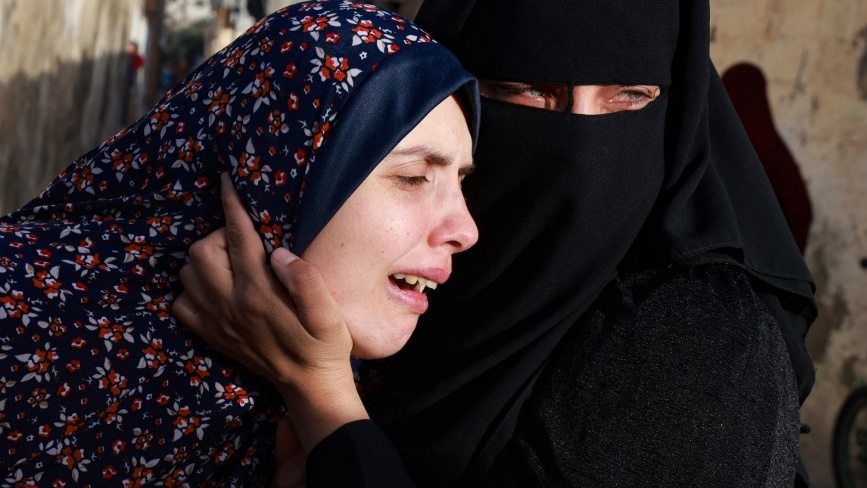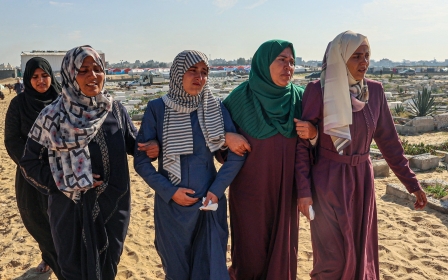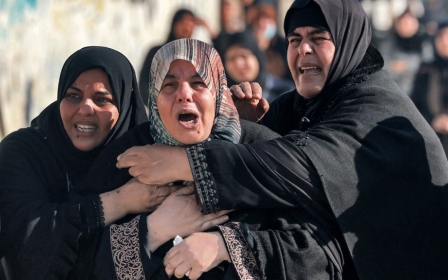International Women's Day: Gaza's women endure grief, hardship and hunger

As the world marks International Women’s Day, the meaning of this celebration has been eroded for Palestinian women in Gaza amid Israel’s prolonged war on the territory.
The United Nations women’s agency has noted that women and girls pay the highest price in times of conflict - and during five months of war, women in Gaza have endured unimaginable challenges.
The war has had devastating impacts on Gaza’s female population. Thousands have been killed, with women and children comprising around 70 percent of the victims. Two mothers are killed every hour in the war, the UN reports.
These were strong, resilient women who excelled in journalism, engineering, medicine, politics, academia and other fields. Each had a unique story before the Israeli army ended their lives.
Other women have experienced the devastating loss of family members. “He was kind, caring and generous,” Aziza NasraAllah told Middle East Eye of her husband, who recently died in northern Gaza. “He never failed to provide me with everything I wanted, despite the challenging economic conditions we lived in … I cannot imagine having to raise two children on my own.”
Stay informed with MEE's newsletters
Sign up to get the latest alerts, insights and analysis, starting with Turkey Unpacked
To support her family, she now earns a meagre income by cleaning public bathrooms in shelters for displaced people.
Conditions in these shelters are incredibly challenging, with little privacy. In cramped tents and crumbling schools, women find themselves sharing spaces with strangers. Many have been forced to move repeatedly, amid a shortage of safe and comfortable housing. Women, especially those who are pregnant, struggle to sleep on uneven ground.
'It breaks my heart'
On rainy winter days, women hang wet clothes and blankets out after water seeps into their tents. In the town of al-Mawasi, Mirvat Saidy says she has been displaced nine times in around three months, along with her three daughters, one son-in-law, and two grandchildren.
“It is incredibly difficult to endure multiple displacements, to constantly search for a warm and welcoming shelter,” Saidy told MEE. “It pains me deeply, and it breaks my heart to witness the absence of a safe place where my daughters can find solace.”
Even before this latest war, Israel’s siege of Gaza had taken a heavy toll on women and girls by undermining living conditions and restricting access to essential services. But now, they feel they have been sent back to the Stone Age, as they hand-wash laundry, gather firewood, fetch water and bake bread with limited resources.
Follow Middle East Eye's live coverage of the Israel-Palestine war
One woman lamented the loss of easily accessible bread from the bakery, while another shared her struggle of washing her children’s clothes with sea-salted water. Basic necessities, such as electricity and running water, have become luxuries, making even the most mundane tasks arduous and time-consuming.
Many women, including my own mother, have experienced significant weight loss, amid a scarcity of ingredients and basic food items.
The war has also severely limited our access to menstrual hygiene products. I will never forget wandering through the streets of Rafah, tirelessly moving from one pharmacy to the next in search of sanitary pads. Many have resorted to using kitchen napkins as a substitute, but such unhygienic alternatives can lead to infections. It is embarrassing to write these words, but it is important to highlight the deprivation women are enduring in Gaza.
On International Women's Day, let us remember the women of Gaza, and strive for a future where we can reclaim our safety and rights
Sally Afana, the mother of a 13-year-old girl, said her daughter experienced her first period during the war while living in a tent. “I had always intended to guide my daughter through the journey into womanhood, emphasising the importance of cleanliness. It was a joy for me to share those teachings with her,” she told MEE. “But then the war came, and her period arrived while we were living in a tent. It was an unfortunate circumstance we had never anticipated.”
Some women in Gaza have given birth in makeshift tents without anesthesia. The UN estimated in December that there were around 50,000 pregnant women and more than 180 births every day. But the joy of bringing new life into the world has been overshadowed by fear and insecurity.
Anwar Abu Mousa recalled walking from her tent in Rafah to hospital on foot while she was pregnant, as there was no other mode of transportation. During her pregnancy, she suffered from calcium deficiency, as her husband endlessly searched markets for eggs and milk.
When he finally found three eggs, she felt guilty eating them as her three daughters looked on, and ultimately divided the precious resources among them.
“I am a mother,” Abu Mousa told MEE. “I never anticipated that my life would be filled with such hardships. The weight of these feelings is too much to endure.”
While gender-based violence is often associated with male oppressors, women in Gaza face an additional form of oppression from Israel’s blockade and war.
On International Women’s Day, let us remember the women of Gaza, and strive for a future where we can reclaim our safety and rights.
The views expressed in this article belong to the author and do not necessarily reflect the editorial policy of Middle East Eye.
Middle East Eye delivers independent and unrivalled coverage and analysis of the Middle East, North Africa and beyond. To learn more about republishing this content and the associated fees, please fill out this form. More about MEE can be found here.





